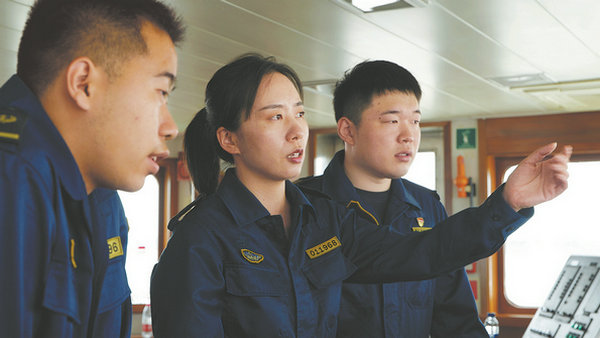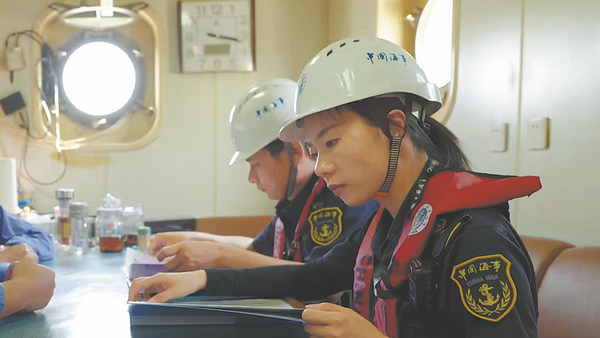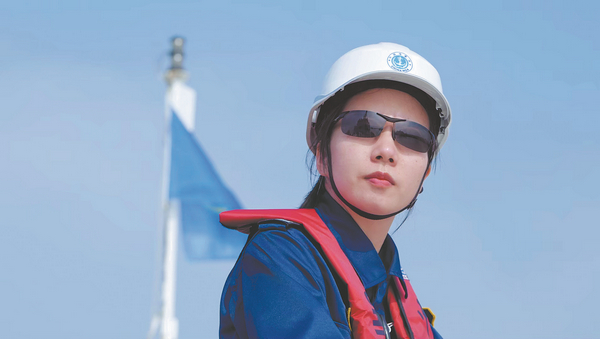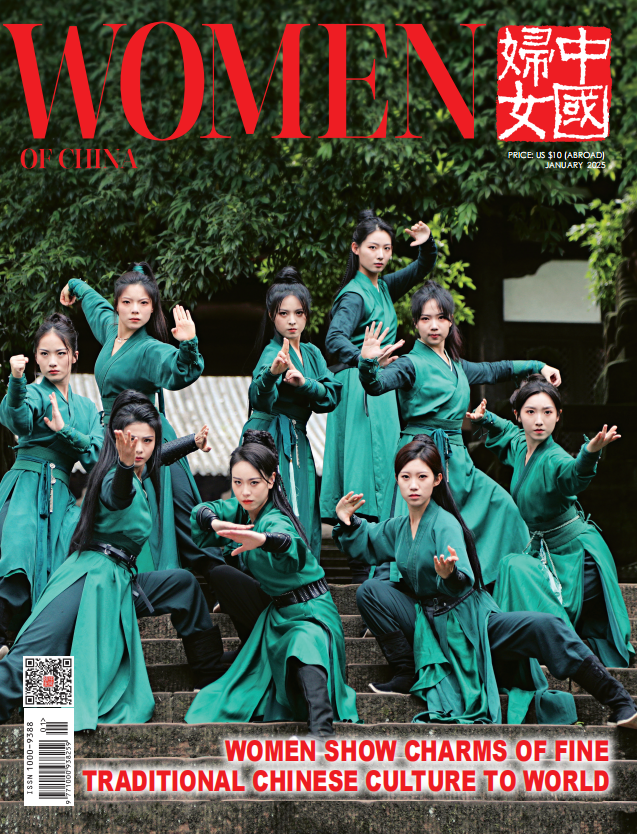The Sister Who 'Makes Waves'
 |
| Zhan Chunpei (center) is captain of the Haixun 01, a 5,000-ton patrol vessel belonging to the Shanghai Maritime Safety Administration. [China Daily] |
At just 33, Zhan Chunpei has already achieved several significant milestones in her maritime career. She is the captain of the Haixun 01, a 5,000-ton patrol vessel belonging to the Shanghai Maritime Safety Administration, and manages a 35-person crew, making her the first woman captain of a public oceangoing ship in China, and she has participated in 20 major search and rescue missions, including the search for the missing Malaysia Airlines flight MH370.
"I call myself a real 'sister who makes waves'," she tells China Daily in an exclusive interview, referring to the popular reality show Sisters Who Make Waves, in which women celebrities, mostly over the age of 30, are challenged to stage performances that defy Chinese showbiz stereotypes about age.
Zhan began her maritime career at the Shanghai Maritime Safety Administration after graduating from the Shanghai Maritime University in 2013. Despite having a variety of opportunities open to her, she chose to dedicate herself to life at sea.
When she heard that the Haixun 01, one of the country's largest and most advanced maritime patrol and rescue vessels at the time, was being commissioned, Zhan set her sights on it.
"I requested a shipboard position several times until a chance finally opened up," she says.
Her opportunity came in 2014 when the Haixun 01 was dispatched as command ship for the Chinese fleet taking part in the search for Flight MH370 in the southern reaches of the Indian Ocean. The ship was in urgent need of rescue personnel and Zhan volunteered, becoming a trainee third officer. The experience gave her a passion for maritime rescue operations.
"I would say the starting point of my maritime rescue career was quite high," she says. "As the on-site command ship for the Chinese fleet, we demonstrated China's technical prowess, and our commitment to international search and rescue efforts."
 |
| Zhan in a work meeting. [China Daily] |
Zhan's involvement in multiple search and rescue missions changed her perception of maritime rescue operations. Before they can enjoy the knowledge that they have helped save people, often at the very last moment, rescuers have to deal with the pressure of searching the vast, featureless ocean for signs of life.
"Still, every additional effort we make gives those in distress another chance of survival," she says.
This belief was borne in late 2015 when a fishing vessel capsized in the Yangtze River's estuary area, leading to nine people going missing. As third officer, Zhan assisted the captain with on-site coordination.
"Our first scan of the vessel detected no signs of life. As we were about to depart, our boatswain took the risk of jumping onto the overturned hull for a final check, and he was able to hear a survivor," Zhan says. "The captain immediately requested assistance from the maritime rescue center, and after efforts by all parties involved, we successfully rescued a fisherman, who had been trapped for 36 hours."
In January 2018, she faced one of her most challenging missions when the Sanchi, a tanker carrying 110,000 metric tons of highly flammable condensate oil, collided with another vessel in the East China Sea and caught fire. By then a second officer, Zhan was urgently recalled from leave.
"As the on-site command vessel, we had to get close to the stricken ship for an inspection," Zhan says. "We had multiple tasks — rescuing people in distress, controlling the fire, and monitoring oil spills. It was a significant challenge and required us to balance our own safety with coordinating 32 surface and air rescue units, both domestic and international."
A clear mind was needed.
"Emotions can cloud your judgment, so I've learned to remain dispassionate when lives are at stake," she explains. "You can reflect on the tragedy later; but in that moment, it's essential to be calm and collected."
The operation took 117 days to complete.
Such intense situations have honed Zhan's ability to analyze calmly, respond coolly, and develop rapidly as a maritime professional. In 2020, she was promoted to chief officer, and given command of the deck department and crew.
Three months ago, she reached her biggest career milestone yet, not only becoming captain, but also the first woman captain of a public oceangoing ship in China.
"That first time I took the Haixun 01 into port as captain, I felt an incredible sense of accomplishment," she says. "Precisely maneuvering a vessel this size between other ships, while factoring in the wind, currents, and everything, is an immense challenge, but one I relish."
According to a 2023 report on the development of seafarers, there were nearly 2 million registered seafarers under the age of 65 in China at the end of last year, with women accounting for approximately 15 percent. While acknowledging the unique challenges women face as a minority in the maritime sector, Zhan says that gender is not a factor in her work.
She notes that the greatest pressure probably comes from the attention she receives as one of the few women in the field.
"When I first started, I had to find a way to integrate with the team. My first step was to be accepted, then to achieve results, and gain recognition," she says, recalling her early days onboard.
She argues that the job itself is gender-neutral.
"Being male or women isn't the determining factor. We should respect individual differences. Not all men are suited for work onboard, nor are all women unsuited. What matters is their passion for the work and how well it aligns with their abilities."
 |
| She is the first woman captain of a public oceangoing ship in China and has taken part in around 20 major search and rescue missions. [China Daily] |
Zhan also believes that increased women participation has demystified a role once seen as purely male, and that diversity of perspective is a strength.
"Having both genders creates different perspectives and voices when it comes to approaching issues. It fosters a more diverse environment conducive to overall development," she says.
Zhan adds that technological advancements and automation have reduced the physical demands of many maritime jobs, making them more accessible to women. "Today, it's more about endurance and mental acuity. With a healthy lifestyle and regular exercise, most tasks are manageable for women."
She also advocates for measures to attract more women to the maritime sector, suggesting more tailored career plans and support systems. "For instance, we could ensure that the necessary feminine hygiene products are available onboard, especially on long-distance voyages."
Beyond her maritime duties, Zhan has been involved in academic research to improve psychological support for survivors of maritime accidents. Having witnessed the mental harm resulting from such terrifying experiences, she is determined to complement rescues with mental health assistance.
Through partnerships with major hospitals, Zhan and her colleagues are seeking to develop comprehensive emergency plans that improve efficiency while addressing the psychological needs of survivors.
"Rescuing a person is only half the battle," she says. "Neglecting their psychological wounds does them a disservice. My dream is for this human element to become an integral part of our rescue protocol."
Looking ahead, Zhan is aiming higher.
"I hope to contribute more to the maritime sector and be a voice for women in different roles within the field," she says.
For those considering a maritime career, Zhan has a piece of advice. "If you have a passion for this kind of work or a dream to enter the field, take the plunge. The difficulties you imagine are often far greater than those you encounter in reality."
(Source: China Daily)
Editor: Wang Shasha
Please understand that womenofchina.cn,a non-profit, information-communication website, cannot reach every writer before using articles and images. For copyright issues, please contact us by emailing: website@womenofchina.cn. The articles published and opinions expressed on this website represent the opinions of writers and are not necessarily shared by womenofchina.cn.






.jpg)

 WeChat
WeChat Weibo
Weibo 京公网安备 11010102004314号
京公网安备 11010102004314号